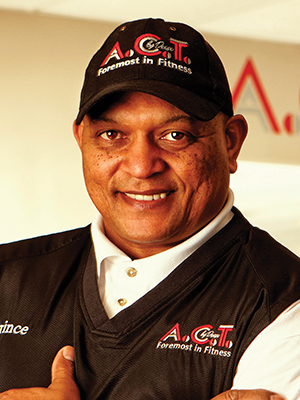 Prince Deese
Prince DeesePrince Deese, an All American Wrestler, a Hall of Fame Football Player, and a State Champion Body Builder, is a certified personal trainer and strength conditioning specialist. Prince Deese and Gina Deese own A.C.T. by Deese, a Fitness & Training Center in Greensboro, NC. Contact him at 336-617-5304.
Spinal health is particularly important for aged individuals because spinal compression can occur over the years, creating many problems. Many people lose a fraction of their height as they grow older due to years of spinal compression, leading to spinal bending, nerve pain, and a physical report that you may be shrinking and becoming shorter. It is vital to maintain the health of the spine for quality of life.
The skeleton is responsible for allowing movement in the body, and the spine forms the skeleton’s core which, when damaged, can negatively impact daily life.
The spine comprises 33 vertebrae, which originate in the skull’s base and end near the tailbone or coccyx region. Let us explore the impact spinal health plays on daily life and how you can ensure its healthy functioning through exercise.
The Function of the Spine
The spine is a complex skeletal structure supported by strong muscles, which aid all kinds of movements in various directions. Bending, lifting, getting dressed, standing up, and fall prevention to mention a few.
Flexibility is possible due to the spine’s ability for locomotion. Inter-vertebral disks and the natural curvature of the spine allow for shock absorption, which prevents injuries from higher impact movements like jumping, jogging or even just walking.
The spine is also responsible for weight distribution and allows the chest, head and pelvis to balance themselves while preserving body strength.
Many nerves pass through the spinal column and play a vital role in perceiving signals from the external environment to ensure the body responds appropriately.
The central nervous system (CNS) utilizes the spine to transmit electric impulses to the brain and produces sensational feelings in the body. We can understand sensory information, including hot and cold sensations, touch, pain, and pressure on the skin, thanks to the spine.
An injured spinal cord can affect the neuronal responses in various body parts which can cause dysfunction of awareness of our movements in space called proprioception.
How to Maintain a Healthy Spine
Lift weights responsibly at the gym by maintaining proper form and selection of the proper weight. Use progressive training which means to build your strength slowly because big jumps in weights can result in injuries.
Spinal column injuries are challenging to recover from, and you should leave your ego at the door and choose low –risk movements to train safely for functional fitness.
Sleep also plays a vital role in spinal health, which is why it is necessary to invest in a firm and sturdy mattress that promotes correct alignment of the neck and spine.
Exercising and maintaining proper flexibility through stretching is an excellent way to improve spinal health. Individuals can benefit from swimming, walking or jogging, which strengthens the muscles and alleviates lower back pain from many underlying conditions. Exercise is also crucial for maintaining adequate joint mobility and minimizes risks of developing an injury.
Being overweight puts unnecessary strain on the spine and general wear and tear on the muscles, tendons and ligaments.
Once again, a basic exercise program independently or with the help of a trainer can help maintain spinal health. Staying on top of your wellness checks with your physician or contacting a chiropractor are important resources for spinal checks. Remember also to drink water regularly throughout the day as hydration improves body functions and the nervous system.
A.C.T. By Deese offers the expertise of professionals who are trained to offer guidance regarding the importance of spinal health and general well-being.
Instead of waiting for problems to develop, the best course of action is to take corrective measures and prevent any issues from arising.
As we age, it is our responsibility to look after our bodies and ensure that we maintain our health and fitness to prevent the development of serious conditions.

